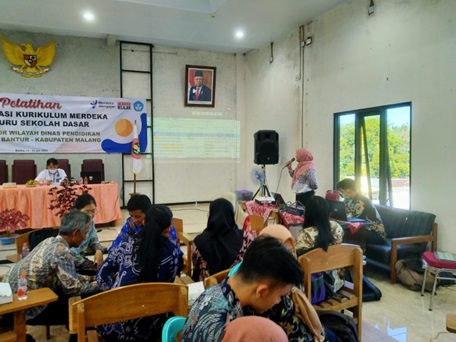Pelatihan Pengembangan Modul Ajar Berbasis Implementasi Kurikulum Merdeka bagi Guru Sekolah Dasar di Kecamatan Bantur Kabupaten Malang Training on the Development of Teaching Modules Based on the Implementation of the "Merdeka" Curriculum for Elementary School Teachers in Bantur District, Malang Regency
Main Article Content
Abstract
Community service activities with the theme of training in developing teaching modules based on the implementation of the "Merdeka" curriculum for elementary school teachers in the Bantur District, Malang Regency. The objectives of this activity are to assist teachers in developing teaching modules based on the implementation of the "Merdeka" curriculum, to assess the performance level of the resource persons, and to assess the performance level of the organizing committee. The community service activities were conducted through several methods including lectures, discussions, Q&A sessions, modeling, demonstrations, Problem-Based Learning (PBL), and assignments. Participants consisted of 103 teachers from grades 2 and 5. Supporting instruments for this community service include pre-test and post-test sheets, and program evaluation questionnaires. The training material covers the implementation of the "Merdeka" curriculum, characteristics of learning in the "Merdeka" curriculum, and the development of assessment instruments for student learning outcomes. The results of this training indicate a 35.7% improvement in teachers' ability to develop teaching modules, 56.31% performance level of the resource persons in assisting participants categorized as good, and 74.76% performance level of the organizing committee categorized as very good.
Downloads
Article Details

This work is licensed under a Creative Commons Attribution-ShareAlike 4.0 International License.
Authors who publish with this journal agree to the following terms:
- Any article on the copyright is retained by the author(s).
- Author grant the journal, right of first publication with the work simultaneously licensed under a Creative Commons Attribution License that allows others to share work with acknowledgment of the work authors and initial publications in this journal.
- Authors are able to enter into a separate, additional contractual arrangements for non-exclusive distribution of published articles of work (eg, post-institutional repository) or publish it in a book, with acknowledgment of its initial publication in this journal.
- Authors are permitted and encouraged to post their work online (e.g., in institutional repositories or on their websites) prior to and during the submission process, as can lead to productive exchanges, as well as earlier and greater citation of published work.
- The article and any associated published material is distributed under the Creative Commons Attribution-ShareAlike 4.0 International License
References
Angga, Suryana, C., Nurwahidah, I., Hernawan, & Prihantini. (2021). Komparasi Implementasi Kurikulum 2013 dan Kurikulum Merdeka di Sekolah Dasar. Jurnal Basicedu, 5(5), 3829–3840. https://dx.doi.org/10.31004/basicedu.v6i4.3149
Effendy, I. (2016). Pengaruh Pemberian Pre-Test dan Post-Test Terhadap Hasil Belajar Mata Diklat HDW.DEV.100.2.A.pada Siswa SMK Negeri 2 Lubuk Basung. VOLT Jurnal Ilmiah Pendidikan Teknik Elektro, 1(2), 81–88. https://dx.doi.org/10.30870/volt.v1i2.2873
Fitriyah, C. Z., & Wardani, R. P. (2022). Paradigma Kurikulum Merdeka Bagi Guru Sekolah Dasar. Cholaria: Jurnal Pendidikan Dan Kebudayaan, 12(3), 236–243. https://doi.org/10.24246/j.js.2022.v12.i3.p236-243
Hapsari, P. R., & Marom, A. (2017). Evaluasi Pelaksanaan Pendidikan dan Pelatihan Teknis Kompetensi Pengelolaan Perkantoran Berbasis Teknologi Informasi (TI) Angkatan II Tahun 2014 Pada Badan Pendidikan dan Pelatihan Provinsi Jawa Tengah. Journal of Public Policy and Management Review, 6(2), 467–481.
Hapudin, H. M. S. (2021). Teori Belajar dan Pembelajaran: Menciptakan Pembelajaran yang Kreatif dan Efektif. Jakarta: Prenada Media.
Hariyati, N., Bhayangkara, A.N., Islamiah, N., and Ahmadi, W. H. 2023. “Relationship between Organizational Culture Openness and Teacher Readiness Quality with School Dynamic Effectiveness in One-Roof Schools.” JPI (Jurnal Pendidikan Indonesia) 12(3):528–42. https://doi.org/10.23887/jpiundiksha.v12i3.61068
Iskandar, A. (2019). Evaluasi Diklat ASN M odel Kirkpatrick (Studi Kasus Pelatihan Effective Negotiation Skill Balai Diklat Keuangan Makassar). Jurnal Pendidikan, 20(1), 18–39. https://doi.org/10.33830/jp.v20i1.229.2019
Megayanti, W., & Asri, K. H. (2022). Transformasi Gaya Kepemimpinan Kepala Sekolah Dalam Penerapan Merdeka Belajar. Research and Development Journal of Education, 8(2), 771. https://doi.org/10.30998/rdje.v8i2.14072
Menzies, Holly M., Kathleen Lynne Lane, Wendy Peia Oakes, Karen Ruth, Emily D. Cantwell, and Lucia Smith-menzies. 2018. “Active Supervision : An Effective , Efficient , Low-Intensity Strategy to Support Student Success.” http://dx.doi.org/10.1177/1074295618799343
Novita, Mega, Nugroho Dwi Saputro, Alok Singh Chauhan, and Rahmat Robi Waliyansyah. 2022. “Digitalization of Education in the Implementation of Kurikulum Merdeka.” KnE Social Sciences 7(19 SE-Articles). https://doi.org/10.18502/kss.v7i19.12438
Nugraha, T. S. (2022). Kurikulum Merdeka untuk Pemulihan Krisis Pembelajaran. Inovasi Kurikulum, 2, 160. https://doi.org/10.17509/jik.v19i2.45301
Perwitasari, E., Setyawan, A., Wahyudi, S., & Sigit, H. T. (2022). Seminar Dan Lokakarya Pemanfaatan Teknologi Informasi Dalam Rangka Peningkatan Bahan Ajar di SMPIT Ar-Raudhah Albantani. Dasabhakti: Jurnal Pengabdian Masyarakat, 1(1), 38–42. https://doi.org/10.30656/dasabhakti.v1i1.5219
Tamsuri, A. (2022). Literatur Review Penggunaan Metode Kirkpatrick Untuk Evaluasi Pelatihan di Indonesia. Jurnal Inovasi Penelitian, 2(8), 2723–2734. https://dx.doi.org/10.47492/jip.v2i8.1154
Widoyoko, E. P. (2017). Evaluasi Program Pelatihan. Yogyakarta: Pustaka Belajar.
Yulianti, E., & Gunawan, I. (2019). Model Pembelajaran Problem Based Learning (PBL): Efeknya Terhadap Pemahaman Lonsep dan Berpikir Kritis. Indonesian Journal of Science and Mathematics Education, 2(3), 399–408. http://dx.doi.org/10.24042/ijsme.v2i3.4366
